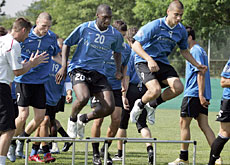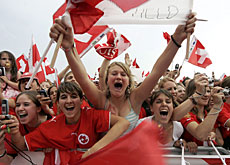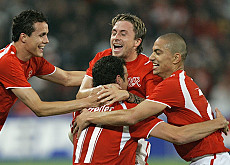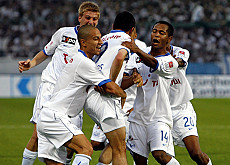Swiss football seeks the limelight

Switzerland's football season gets underway this week with many fans and experts hoping that this year's competition will be the best yet.
New stadiums, greater television coverage and Switzerland’s co-hosting of Euro 2008 at the end of the season are all cited as factors that could help bring Swiss domestic football out of the shadows of its European neighbours.
“Football nation Switzerland” was the upbeat headline in a recent Blick editorial as the Swiss tabloid looked ahead to this week’s restart. The newspaper listed recent investment in youth development and good work by the national football association as some of the reasons for optimism.
The tight race for top honours between FC Zurich and FC Basel over the past two campaigns has certainly added to the excitement.
Eagerness among Swiss players wanting to be part of the Euro 2008 squad has also led a clutch of internationals to head home in the hope of catching the eye of national coach Köbi Kuhn.
Marco Streller, Benjamin Huggel, Ricardo Cabanas and Bernt Haas are among those making a return to the country’s top division.
But the Swiss league is still a long way behind its international counterparts. Many fans still prefer to follow a club in Germany’s Bundesliga, Italy’s Serie A or the French Ligue 1 than their own local side.
Switzerland’s top division has also long served as a ‘feeder’ league for other bigger footballing nations.
No radical changes
Even the Swiss league’s own officials insist that Euro 2008 and the accompanying return of a handful of Swiss internationals are not going to bring about a radical change.
“We have to see the reality,” the Swiss league’s senior manager Edmond Isoz told swissinfo. “It’s good that some players are coming back here but […] we are still losing many more good players than that.”
As prime examples, Isoz lists Swiss internationals Blerim Dzemaili, Gökhan Inler and Xavier Margairaz who all left Zurich over the summer to play in Spain, Italy and England.
Basel have meanwhile lost Croatian striker Mladen Petric – last season’s top scorer – to German side Borussia Dortmund. Talented teenager Ivan Rakitic, who played for Switzerland’s under-21 side before opting to represent Croatia, left Basel as well in favour of another German club, Schalke.
“As a smaller country with no major private television firm providing funds, it’s clear we cannot compete with the big leagues in Germany, France, England, Italy or Spain,” added Isoz.
Although a new television deal is in place for this season, the league manager says it cannot be compared to the one that saw English football transformed with the advent of a Premier League financed largely by television money.
For one thing, the size of the investment in Swiss television rights is much smaller.
Pay-tv company Teleclub signed a contract for a three-year deal worth more than SFr12 million ($10 million) to broadcast Swiss league matches. It plans to show 130 this season.
But this pales in international comparison. Sky recently stumped up £1.314 billion (SFr 3.23 billion) for its own three-year deal to show 92 Premier League matches per season.
Not too expensive
“There has been criticism that the money paid for the Swiss television rights was too low, but I don’t agree with that,” says Hans-Willy Brocker, founder and CEO of the St Gallen-based consultants ESB.
“I think the Swiss league is a good product in terms of quality – when you see that the Swiss national team reached the last 16 of the World Cup and that so many players go on from playing in Switzerland to join top clubs.”
But Brocker reckons that low turnouts at matches and smaller television audiences mean that paying more for television rights would be unrealistic.
The Swiss league is setting its sights on general consolidation of its position in Europe along with some steady improvements in areas such as attendance figures.
“Our crowd figures last season were better than ever and this season we should average more than 10,000 people a match for the first time,” says Isoz. “Of course we will never be like Spain or Germany but we have to try to at least match our recent performances in international competition.”
swissinfo, Mark Ledsom
Recent Swiss top division average attendance figures:
2002-3 8,676
2003-4 8,991
2004-5 8,311
2005-6 7,993
2006-7 9,482
July 18: Grasshoppers Zurich vs St Gallen
July 21: Lucerne vs Neuchatel Xamax, Thun vs Sion
July 22: Aarau vs Young Boys, Basel vs FC Zurich
How European football’s governing body UEFA currently rates Europe’s leagues (out of 53 countries)
1: Spain
2: Italy
3: England
4: France
5: Germany
6: Portugal
7: Netherlands
8: Greece
9: Russia
10: Romania
11: Scotland
12: Belgium
13: Ukraine
14: Czech Republic
15: Turkey
16: Switzerland
17: Bulgaria
18: Israel
19: Norway
20: Austria

In compliance with the JTI standards
More: SWI swissinfo.ch certified by the Journalism Trust Initiative



You can find an overview of ongoing debates with our journalists here. Please join us!
If you want to start a conversation about a topic raised in this article or want to report factual errors, email us at english@swissinfo.ch.